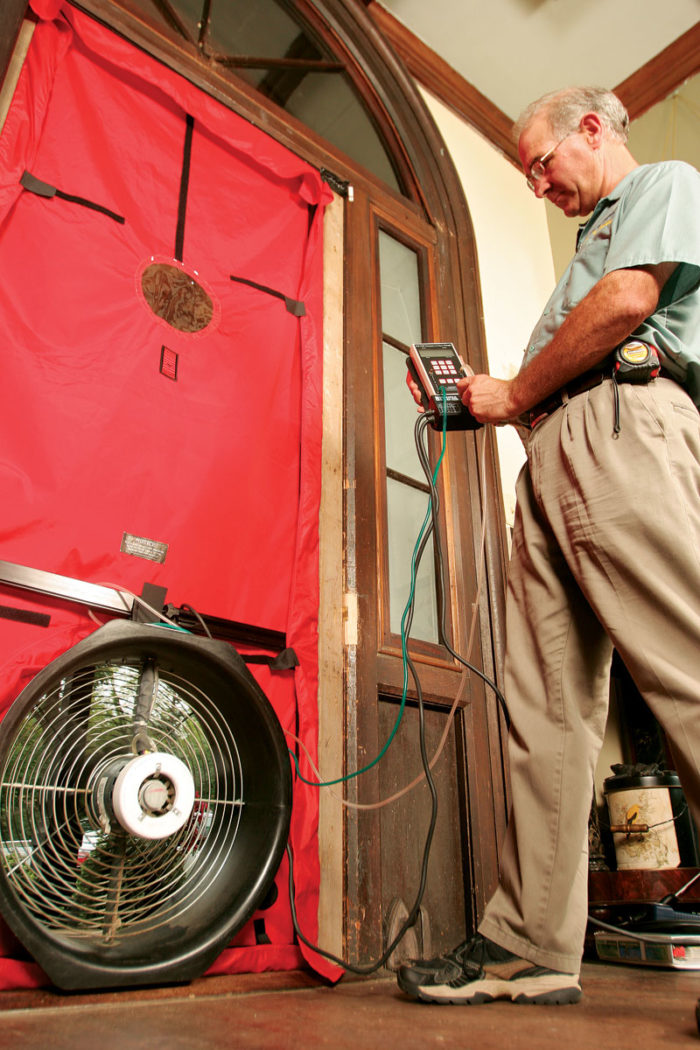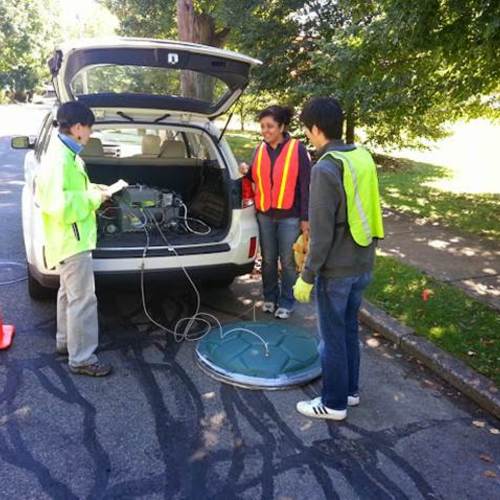
Finding air leaks:
A blower-door test is helpful in tracking down the source of air leaks, but for one homeowner it revealed an entirely different kind of problem.Image Credit: FHB
What began as an attempt to track down the source of air leaks in his one-year-old home has [no-glossary]led[/no-glossary] Kevin Hilton to a deeper mystery — a natural gas odor that is apparent only when energy auditors are running a blower-door test.
As Hilton explains in a Q&A post at GreenBuildingAdvisor, the source of the gas leak has been impossible to track down so far.
“During the blower door test run at 50 Pa, I began smelling natural gas,” Hilton writes. “The test was immediately stopped and the smell dissipated. The natural gas hand-held detectors were unsuccessful in detecting a leak with the blower door turned off. The operators then turned the blower door back to 25 Pa, and behind one of the walls the detectors isolated the area of the leak.
“The problem, however, is that there are no gas lines located behind this particular wall where the leak was detected.”
The plumber who installed the gas lines said he couldn’t detect any leaks with his equipment.
“What do I do now?” Hilton asks. “It seems like the natural gas leak is only detectable with the blower door in place and operating. I am concerned since based on the results of the audit I believe I am going to spray foam the attic and turn it into a conditioned space. I don’t want to create a closed envelope with combustion hazard.”
This puzzle is the topic of this week’s Q&A Spotlight.
Test the gas lines
David Meiland suggests going directly to a gas-line test rather than spending any more time doing spot checks around gas-burning appliances with a gas sniffer.
His two-pronged plan of attack starts with disconnecting all of the…
Weekly Newsletter
Get building science and energy efficiency advice, plus special offers, in your inbox.

This article is only available to GBA Prime Members
Sign up for a free trial and get instant access to this article as well as GBA’s complete library of premium articles and construction details.
Start Free TrialAlready a member? Log in












4 Comments
Gas smell
I would call the local utility to check the ground outside. There could be a leak in the main & when the blower is on it sucks it through a void or crack in the foundation.
Gas Smell
Not to throw a wrench in the pile, but 'natural' gas (methane) is odorless. Utility companies add mercaptans (sulfur compounds) to give it a noticeable universal odor. One question is whether the detectors were specific for methane or for mercaptans. Both varieties exist. There are many sources of sulfur odors, and it could be one of those rather than fuel gas.Sewer gas is one, sulfur in ground water another. Does the house have public utility water or is it on a well? Is it on a septic system or connected to a POTW? New construction - has settling cracked a sewer lateral from the house to the street, or has the back flow preventer or lateral trap been damaged? Lots of possibilities. (Interesting mix of required talents - you either need a builder who was a chemist, or a chemist who was a builder . . .)
Gas Smell
I am hoping you will follow this up later with the answer as to where the gas smell was coming from. I'm really curious now.
Smell under negative pressure
Senior editor Martin Holladay has my vote! Although I have been out of the business for almost 30 years, back in the late 1970s and early 1980s I ran an operation with 5 "blower door crews" and as many as 15 techs doing remediation. We ran into sewer gas several times. I think seldom used dishwashers, showers or laundry drains were the most common culprits. We are in a dry climate and traps on unused drains dry out and become ineffective. A bad wax ring seal on a toilet could have the same effect -- leakage of sewer gas, which can smell like natural gas. The peppermint in the drain pipe is a great idea. We never thought of that!
Log in or become a member to post a comment.
Sign up Log in